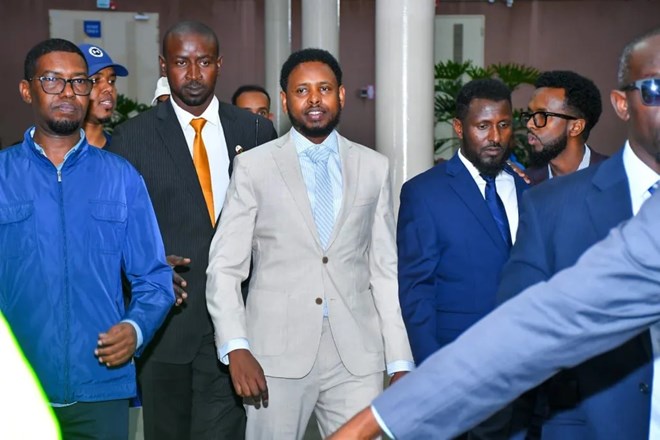
Monday August 26, 2024
Abdullahi Ali (center) arrives at Jomo Kenyatta International Airport in Nairobi, Kenya, on July 7. Photo by Mohamed Shire
PORTLAND, Maine (HOL) — After years of building a life in the United States, Abdullahi Ali, a former Somali refugee, has returned to his war-torn homeland with a bold mission: to run for president of Jubaland, a region still gripped by conflict and instability.
In 2021, Ali returned to Jubaland after years abroad, and what he encountered was a sobering reminder of the challenges his homeland faces. "The poverty was overwhelming," he reflected. "I saw it in the eyes of the people, in the worn-out streets, in the makeshift homes that offered little more than shelter. I couldn't ignore it."
advertisements
Ali's story begins in Somalia, where, at 17, he was forced to flee the violence that erupted with the onset of the civil war. He sought refuge in a camp in Kenya, where, despite the hardship, he managed to study sociology and public administration at the University of Nairobi. By the time he reached his 30s, Ali and his brother and sister were resettled in Lewiston, Maine, through a United Nations program.Once in the U.S., Ali thrived. He earned multiple degrees, including a doctorate, and founded Gateway Community Services in 2015, a nonprofit supporting immigrants in the Portland area.
But even as he built a successful life in the U.S., Ali could not escape the pull of his homeland. A visit to Jubaland in 2021 was a turning point when he realized he could no longer remain on the sidelines. "Returning to Somalia was not just about revisiting my roots; it was about recognizing a responsibility that I couldn't ignore," he says.
Running for president in Jubaland is no small feat, particularly due to the entrenched power of the current leader, Ahmed Madobe. Madobe has been in power since 2013 and has recently secured the ability to run for an unprecedented third term through constitutional amendments that abolished term limits. Like much of Somalia, the region suffers from political instability, where elections often lack the democratic integrity seen in the West. "In Somalia, elections are fraught with challenges," says Abdi Samatar, a University of Minnesota Twin Cities professor. "Background checks can be weaponized, and election commissions often lack independence, swayed by those in power."
Despite these obstacles, Ali remains committed to his vision for change. His platform focuses on three key areas: defeating Al-Shabaab—which controls large swathes of rural Jubaland, promoting government transparency and accountability, and revitalizing Jubaland's economy and infrastructure. It's a vision that's as ambitious as it is personal.
Despite these obstacles, Ali remains committed to his vision of change. His platform focuses on three key areas: defeating Al-Shabaab, which controls large areas of rural Jubaland, increasing government transparency and accountability, and revitalizing Jubaland's economy and infrastructure.
"I could have stayed in the U.S., where life is easier, where the struggles are different," Ali reflects. "But that would mean turning my back on a country that I still feel a part of, a country that needs leaders who are committed to change."